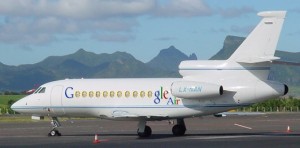On March 16th, 2010, I got the “official” Googleplex tour from Sandra Heikkinen and Sarah Tran of Google’s global communications and public affairs team. They were quite gracious with their time and bountiful with their stories. Here’s what I captured…
As you turn off the 101 onto Amphitheatre Parkway in Mountain View, California, you realize you’re not in Kansas anymore. And you’re certainly not in San Francisco.
Having barely lifted my head from my new Motorola Droid (yes, that’s a Google phone) as I emailed, texted, tweeted, talked and mapped the entire 60 minutes it took me from stepping off the plane at SFO to the AirTran to the rental car to arrive at the Google campus, I didn’t get the subtle transition from the city to the Valley.
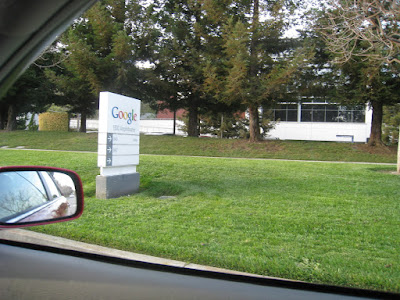
So, when I finally I looked up and took it all in, I quickly found myself in a geek’s wet dream. You could just smell the efficiency in the air. (Smells nothing like napalm in the morning but definitely like victory.)
Pulling into the lot at 1098 Alta where I was to meet a Google PR rep, the first thing I noticed was the biker I had to swerve from hitting. Us city-folk aren’t used to sharing the road. Biking seems to be the preferred mode of transportation around here. And check out those flowering trees. That’s another thing you don’t see much in urbanville…
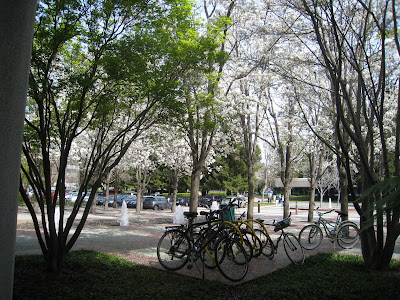
I circled the lot to find a spot where I could park my gas guzzling rental. (Which reminds me, what will the rental car companies do when they can’t profit from the gas underage payments?)
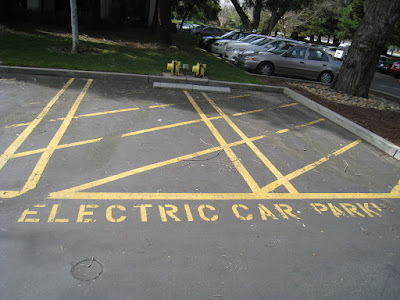
It’s times like these that I wish I was an expecting mom…

I managed to find a visitor’s spot and put the rental in park. I had a few quick business calls to make so I rolled down the windows and let in some of that fresh Mountain View air. It was a beautiful March day. 67 and sunny.

Hopping out of my car to meet my tour guides, Sandra and Sarah, I started to rethink my decision to wear my Google Me shirt. Do they get crap like that all the time? Will they protest my use of their trademark? Will they just think I’m uncool? Whatever.

We started at the famous Building 43 which houses all the big wigs. (As for the small wigs, apparently, salespeople relegated to Crittenden campus.)
Walking into the lobby is a feast for the senses. Just like a Google search results page, there are a plethora of assets vying for your attention.
There’s the Giant Nexus One. The favorite place pins.
And just as quickly as the eyes start racing, the stories start flowing.
There’s the extra doors used as props on windows. (At Google, everything gets use and nothing goes to waste… except maybe Yahoo.)

The eco-friendliness goes deep at Google, with recycled rocks and pebbles on the ground. And all the wood is sustainably-harvested. (Yeah, cuz that’s what I was wondering when I saw those things flapping around up there!)
We pass by conference rooms that look like tents are and are stuffed with recycled denim to make heating and cooling more efficient. I mistook them for makeshift operating rooms where they implant a hatred for Microsoft in your brain.
Sandra rattles off that the Googleplex has almost 10,000 solar panels providing 30% of the electricity needed on campus. I didn’t see any goats mowing the lawns though.
Back in the lobby, a demo was taking place in a multi-screen Google Earth “machine” where you can fly from place to place…

Looking up, you see the SpaceShipOne replica built by Paul Allen and won Ansari X Prize in 2004. Man, these guys accumulate a lot of crap. Apparently, they had to remove the sides of the building to accommodate that bad boy. (Seems like a good use of resources.)
Sarah tells me that someone once left a piano in one of the buildings because they moved out of their apartment and it was too small to hold it. Sure, enough the piano got a lot of use so engineers rigged it up so you could play and listen with headphones.
Here’s the shrine of Chade-Meng Tan, whose official title at Google is Jolly Good Fellow (that nobody can deny). Apparently, he always waited in line for pictures with presidents and other celebs that came to the Googleplex. He hung all the pics in his cube but they moved them to the lobby and now people who visit wait in line for pics with Meng. To date, he’s met with over 100 celebs and rumor is he still keeps in touch with the Dalai Lama. Wonder if he shared the secrets of the algorithm?!?

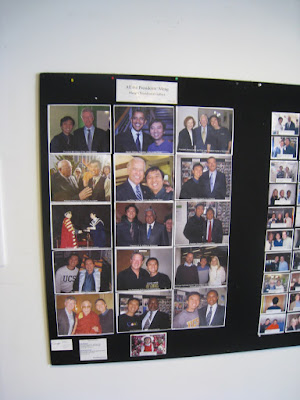
One thing you can’t ignore is the presence of food… everywhere. There are some 15-ish cafés on campus, each with different themes. Many of them focus on organic foods with products procured locally.
Here’s the No Name Café started by Google’s first chef, Charlie, who was also the Grateful Dead’s chef.


It wouldn’t be a dot-com without a pool table. I shudder to think how good these engineers are at calculating the angles and such.
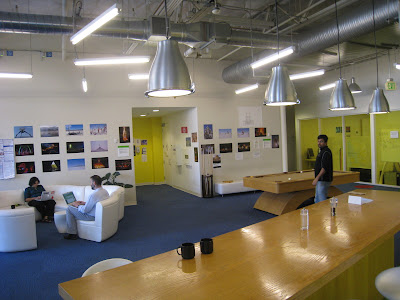
This is outside Building 42 (I think… it’s hard to keep track where you are when your senses are being assailed from every direction).
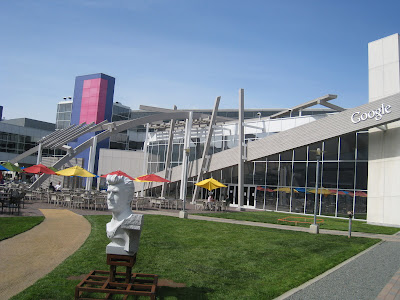
Basically, life at Google goes: Eat. Work. Play. Repeat.
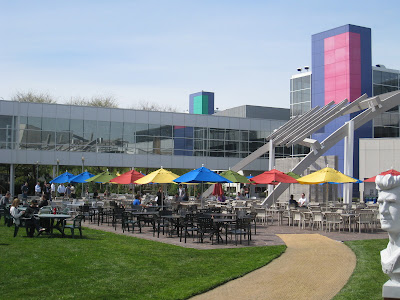
You really never need to leave…

This place really is one big engineer’s dorm room!

Paintings of the Google doodles are scattered all over…

As are Google Places pins…

Another thing you quickly notice is that there are flyers everywhere prodding Googlers to do things break out of your shell. Or put a solar roof over your head.

Hit a softball. (Because that will come in handy when handling those Q’s from reporters.)

Offer your baby for ground-breaking research. Ga ga google.

And don’t forget the 2nd Birthday of the Google Store (not sure what that is but guessing they don’t sell iPhones).

Join the internationalization team! If only Google Translate were available when the Tower of Babel was being built!

Gotta give them credit for making use of all available space. But what’s with all these tree-killing flyers? Surely, there’s a way to cull all these into an e-newsletter?

Growing herbs for the cafeteria…
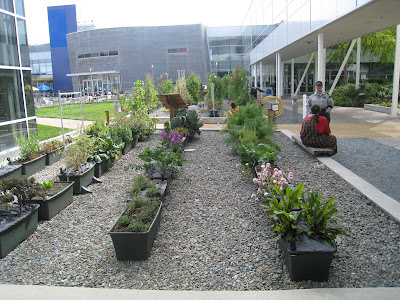
Wow, they really do give out everything here. (Hope this doesn’t just spit out underwater options!)

It’s important to stay active when all you do is sit around all day (and night) programming. (Too bad this volleyball court looks like it hasn’t been used in weeks.)

There was some action in the pool, though. Wonder what he’s doing? Google query: “Signs of drowning”

The gym was packed, too, complete with G-Fit trainers and lockers. (“No pictures, please,” I’m told. “Why, is this where they keep the algorithm?” I respond.)
Back outside, the randomness continues.
This is supposedly the largest complete replica of t-rex skeleton. It was found in South Dakota and cast in bronze. As an April fools prank, someone set up pink flamingos that inched closer to the dinosaur each day before ending up in its mouth on 4/1.
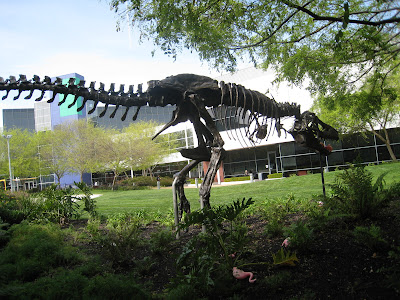
Here’s an oversized Android with Nexus One and giant cupcake, donut, and éclair representing first 3 releases — c, d, e. At the time, no-one knew what the 4th would be. My money was on French Crullers. Turned out to be Froyo. Wonder if they’ll go back to the ice cream well for I with It’s It (which is a Googleplex fave).

After about an hour, my cup runneth over. Too many sights for my sore eyes and stories for my saddle bags.
I bid adieu to Sandra and Sarah and plopped down in this Fujiiryoki massage chair and mooched some free wifi for a couple hours.
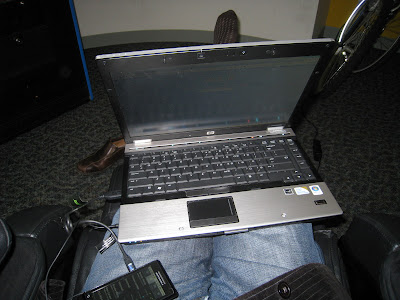
This was in the lobby of Building 44. Apparently this is where the Android development takes place. I figured that out not by the giant Android standing watch outside but by the guy who kept running around the lobby (and up and down the stairs and up and down the stairs) yelling “ONE!” into his phone. (Geez, if he can’t remember the name of the Google phone, he’s got bigger problems than call reception.)
That reminds me of another observation I made at the Googleplex. Something is always beeping. You’re never quite sure what is is (and have to wonder if ANYONE is.) Finally, after a full day on campus, I figured out what I was hearing. That, my friends, is the sound of innovation. It also sounds like a high-tech bomb ready to explode. Victory, indeed.








